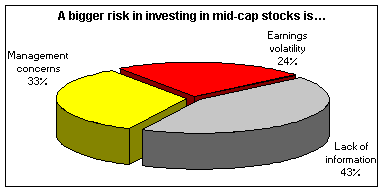In view of the huge rise that was witnessed in mid-cap stocks in recent times, last month we had done an article with the intention of pointing out some of the risks involved in investing in these stocks. That article was a larger perspective as to what we thought were the risks.
However, just to take the exercise a bit further and focus on a relatively micro picture with respect to what investors consider a greater risk in investing in mid-cap stocks, we carried out a poll on Equitymaster by asking, "In your view, what is a bigger risk in investing in mid-cap stocks?" and the options provided were - earnings volatility, lack of information and management concerns. The results are depicted in the chart below.

'Lack of information' (attention companies!) topped the investors' choice as a bigger risk of investing in mid-cap stocks with 43% of them opting for this. 'Management concerns' followed with 33% of votes with the balance 24% having gone in favour of 'Earnings volatility'. Let us now consider each of the above concerns in some detail.
Lack of information: The dictionary defines the word 'information' as 'the communication or reception of knowledge (or intelligence)'. In the current context, communication is from the company and reception of knowledge is by the investor. And the only information dissemination platform for companies is the annual report and to some extent, the quarterly press release along with their quarterly performance report. Then it is at the investor's end to interpret and analyse the information.
However, with respect to most mid-cap companies, unlike large-caps, the flow of information from the management is generally not at its optimum. Information could be pertaining to various facets of the company or the industry in which it operates and which is of absolute necessity to enhance the understanding about the company.
Clarity over the source of revenues, segmental performance (if applicable), clarity over raw material inputs and their availability, market scenario - both domestic and international, etc. are just some of the factors that must form part of the annual report information.
Further, one disadvantage for a mid-cap stock vis-à-vis a large-cap is the fact that the media actively covers the large-cap companies and as such, while the information regarding this is readily available, it is the information with respect to smaller companies that is a concern.
An investor needs 'information' not only to take a rational and sound decision but also take calculated risk (to ascertain the risk-return profile) while investing in a stock. At this juncture, we would like to bring out an extract from the shareholder's letter (1985) of the legendary investor, Warren Buffet which read, "Management cannot determine market prices, although it can, by its disclosures and policies, encourage rational behavior by market participants."
By not disclosing information proactively, some companies actually encourage the 'rumour float' that goes on in the markets. This is one of the key reasons for the investor losing his (her) shirt.
Management concern: Our vote goes to this factor. We believe that a clear and untainted image of the management, in various respects, is of utmost importance.
You wouldn't want a company, which is shareholder unfriendly, is profitable but invests the excess monies to diversify into absolutely unrelated fields of business, transfers monies to subsidiaries for investing in unethical practices (remember the number of companies involved in the Ketan Parekh stock market scam), management compensations are at unrealistic levels, etc. We would like to bring out here another extract from Warren Buffet's letter to shareholders (1984), "We feel very comfortable owning interests in businesses...that offer excellent economics combined with shareholder-conscious managements."
Also read: The 'Management' factor
Earnings volatility: This is a key factor affecting the stock valuations of mid-cap companies. Owing to their relatively small size, volatile growth/de-growth patterns are almost immediately reflected in their stock prices and valuations. It has been seen time and again that mid-cap stocks display greater volatility and they are generally less liquid than the large-caps.
The volatility in earnings could be attributed to the companies' inability to ward off competition or their inability to foresee business trends. Further, since the mid-caps have smaller turnover (partly due to their inability to expand and partly due to the lack of past track record), which could make them a relatively niche player forcing them to rely on a few clients/products for business.
To conclude, while we do agree that mid-cap stocks could become potential winners in the medium to long-term (Infosys was also a mid-cap in the early stages of its growth), it is to be noted that there is a high-risk premium attached to investing in such stocks and investors will have to choose between the tradeoff of risk and return.
The best metric for investing in such stocks should be a thorough research on the company's management and to gauge their expertise and ethics. If this parameter is fulfilled, then the other two aspects, i.e., lack of information and earnings volatility will wear off automatically.
Equitymaster.com is one of India's premier finance portals. The web site offers a user-friendly portfolio tracker, a weekly buy/sell recommendation service and research reports on India's top companies.





